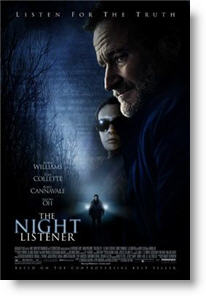The Night Listener
 for language and some disquieting sexual content.
for language and some disquieting sexual content.
Reviewed by: Pete Brown
CONTRIBUTOR
| Moral Rating: | Very Offensive |
| Moviemaking Quality: |
|
| Primary Audience: | Adults |
| Genre: | Mystery Thriller Adaptation |
| Length: | 1 hr. 31 min. |
| Year of Release: | 2006 |
| USA Release: |
August 4, 2006 (1400 theaters) |








What’s wrong with being gay? Answer
Homosexual behavior versus the Bible: Are people born gay? Does homosexuality harm anyone? Is it anyone’s business? Are homosexual and heterosexual relationships equally valid?
What about gays needs to change? Answer
It may not be what you think.
Can a gay or lesbian person go to heaven? Answer
If a homosexual accepts Jesus into his heart, but does not want to change his lifestyle, can he/she still go to Heaven?
What should be the attitude of the church toward homosexuals and homosexuality? Answer
Read stories about those who have struggled with homosexuality
| Featuring |
|---|
| Robin Williams, Bobby Cannavale, Toni Collette, Sandra Oh, Rory Culkin, Joe Morton |
| Director |
|
Patrick Stettner |
| Producer |
| Terry Anderson, Jill Footlick, John Hart, Michael Hogan, Robert Kessel, Armistead Maupin, Jeff Sharp, Brett Williams, Nina Wolarsky, Jamie H. Zelermyer |
| Distributor |
“Listen for the truth”
Robin Williams stars as a radio host seeking the truth about the author of a mysterious manuscript in “The Night Listener”, based on Armistead Maupin’s novel.
In an indirect way, “The Night Listener” attempts to explore the concepts of truth vs. belief. The movie has a timely theme, considering that we live in a day when fiction is presented as fact by journalists and many people believe anything, just because they read it or see it in the media. Unfortunately, the film is uninspired and falls short of it’s potential. Robin Williams, in an uncharacteristly melancholy performance, plays the depressed and conflicted “Gabriel” who is a radio program host whose homosexual lover has just moved out.
Gabriel is in such a slump that he is unable to work. He reads a manuscript written by a mysterious author who describes being abused as a young boy, and something about it intrigues him. Gabriel talks to him on the phone, and a dependant relationship begins to develop (Gabriel’s dependency) with this young boy who is dying of AIDS and other sexually transmitted diseases which he was infected with as a result of being sexually abused by his parents and their friends. “The Night Watcher” depicts a few of the raw and lingering effects of brutally selfish sexuality on the body, mind, spirit and community of the willing or unwilling participants.
Writer/director Patrick Stettner attempts to keep the audience engaged by peeling away layers of riddles which are too easily answered, and the mystery and suspenseful impact end up being minimal.
Peter Nashel’s score helped move the film to a suspenseful and near psycho-thriller tone and pace, at one point. Unfortunately, it was overdone for the scenes and seemed contrived. Much of the film’s pace was painfully slow, and it continued to drag right up through the final scenes.
There was one instance of nudity, several scenes of homosexual innuendo, and a scene with implied child porn along with dozens of instances of profanity. The film had a pro-homosexual view and yet ends with the ironic statement that “Real isn’t how you were made, but what happens to you.” Could this be a writer/director that does not believe people are born gay?
Violence: Minor / Profanity: Heavy / Sex/Nudity: Moderate
See list of Relevant Issues—questions-and-answers.


1. As a Christian, I obviously do not condone profanity, and I certainly despise blasphemy. However, we live in a fallen world, and the reality of life is that many of the unsaved speak that way. From my observation of this film, for the most part, profanity was used in moments of high frustration and injustice and was not largely gratuitous as is sadly the case in many R-rated films. As usual, the blasphemy was unacceptable and should have been left out of the movie.
2. The primary aspect of this film was a very committed search for the truth behind a mystery which Robin Williams’s character was determined to unravel because finding the truth was important to him. The secondary aspect of this film was Williams’s character trying to cope with a dissolving homosexual relationship. This is not what the film was about as some viewers seem to think. The tertiary aspect of this film is the evil practice of child pornography. Although this is a wicked practice, this is ultimately not what the movie is about. The movie is about uncovering lies and deception and a search for the truth which is a noble thing. Without giving too much away, it starts out being about child pornography, but ends up being about something very different. The movie appears to be about a 14-year-old boy, but ends up being about another character in the movie. From this point of view, I think the movie succeeded quite well.
3. If viewers of this film didn’t like the story, it’s not the fault of the filmmaker or screenwriters, because the movie starts out by saying that the film is inspired by real events. We know this is a true story because of what is said in the epilogue and at the very end of the movie credits (Yes. I’m one of the few people who actually watches all the credits right to the very end of every movie.). The fact that this is a true story is what makes it intriguing. If it were fiction, it would fall flat.
Lastly, It saddens me greatly how many Christians go to R-rated films, and then come out of the movie complaining. Movies are rated R for a reason. Why is it so hard for some Christians to understand, that for the most part, goodness and light is NOT what Hollywood is about. Hollywood is about a distorted view of life and reality and promotes a fantasy-filled life which doesn’t exist. It seems to me that most Christians already know this going into a movie. Being an R-rated movie, why do they complain about something they already know about going into the movie, when they come out of the movie? I never understood that mindset.
I’m certainly not advocating tolerance of sin in any way shape or form. What I am advocating is a bit more forbearance on the part of Christians and other viewers, when viewing a movie, and to patiently wait and see how truth is sought after. At the end of the movie, when the viewer understands the psychological ramifications of Toni Collette’s character, it is very appropriate to have compassion for her pain. Unfortunately, based on much viewer response to this Web site concerning movie feedback, there is much rushing to judgment on the part of many viewers which is deeply saddening to me. Sometimes, you have to hear and see the bad before you you can hear and see the good. REMEMBER: The bad news is we are all sinners; the good news is THE GOSPEL and we have a Savior.
The Bible is filled with examples of God’s chosen who committed great acts of sin but then repented. David was a murderer and an adulterer. Moses and Paul (when he was called Saul), were also murderers. I wonder how some Christians would feel if someone unfairly only focused on the sinful aspects of God’s people’s lives in the Bible, without reading about how they repented and how things later changed for the better. I don’t think that they would like it, and they certainly would not think it was fair. It seems to me that judging a movie like this is no different from that. The viewer who walked out after 7 minutes might have had a different reaction if she had waited a bit longer to see how things unfold.
Very Offensive / 3
It was also filmed not far from where I live, so I enjoyed seeing familiar scenery. But, of course, there are a lot of negative and offensive thematic material, such as the lead character’s unhappy homosexual love life and actually, the perversity of most of the characters in the plot. I do not recommend this movie. It is really quite slow and tedious, but for those who like fact-based story lines, this is quite a story, hence my neutral rating.
Offensive / 3
Extremely Offensive / 2
Extremely Offensive / 4
Extremely Offensive / 4
Extremely Offensive / 1
Extremely Offensive / 2
Extremely Offensive / 2
We were expecting a story about a man investigating the life of a boy (whose existence isn’t a certainty) who was formerly a child prostitute who had now written a book on his vile experiences. What we got was a story that seemed mainly about Robin Williams’ character’s homosexual relationship (which was never in the previews or in the article my dad read). Ultimately, we walked out of the theater feeling cheated out of about 80 minutes of our time. If you are trying to find a wholesome movie which will be worth your time and money to go see, do not see “The Night Listener”.
Extremely Offensive / 2
About the movie in general, I thought it was quite stupid. There was no real plot to it, and it had me quite confused for the first half. I don’t know if I should attribute that to book it was based on or how it was made. I was expecting a lot more out of it because of what I had seen in the commercials. The artistic sense of how the movie was made wasn’t bad, it was well done with the scenery, costumes, camera angles, etc.
All in all this movie was a waste of time and a waste of money, instead of seeing this movie go see something else.
Extremely Offensive / 4

The movie covers these topics from a kind of this-is-how-not-to-do-it perspective. I wasn’t surprised by the homosexuality as some others were, because I had read a review that spoke about it. Gabriel (the Robin Williams character) has centered his life around his partner Jess, rather than on Jesus. (The similarity of names is not accidental.) Jess, who is much healthier, leaves the claustrophobic relationship. Gabriel is devastated, and he is launched on a search for a new love to be the center of his life.
The key Christian symbol in the movie is the Christmas Star on the water tower. Gabriel uses the star to find the house of the mother and child. We understand—though he does not—that his real hunger is for God and for genuine fellowship with other people. We see how chilling and painful it is as he goes on this nightmare distortion of a Wise Man’s journey.
Yet by the end he has learned, and in a key conversation with his “night listener” he finally speaks to her with kindness and with her best interest (rather than his own emotional neediness) in mind. He has gained humility and insight and he is able to give Jess his blessing as he waves goodbye in the old Star Trek “live long and prosper” gesture—at once humorous and self-deprecating.
So in an unexpected ironical way we see that through his search, through his following of “yonder star” Gabriel has become 'real'--he is ready to live on a healthier basis. Unlike his “night listener,” doomed to repeat her unhealthy pattern endlessly, Gabriel has found hope of a new life. The Star has truly provided him a “Noon at Night” and he can now “go home by a different road.” The movie’s invitation is for us to do likewise.
My Ratings: Better than Average / 2